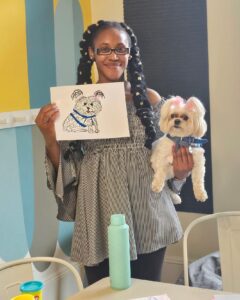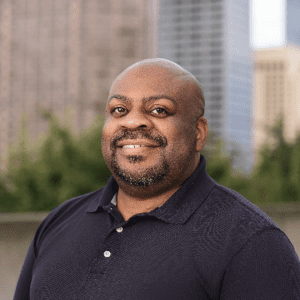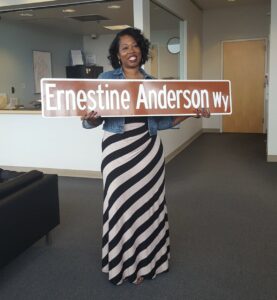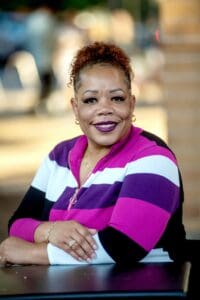“We are still here, present, pushing for equality and having a good time along the way.” — Dr. Nicole Jackson
Meet seven UW Medicine Black employees who are agents of change.
In recognition of Black History Month and the year-round contributions of Black employees, we asked Black community members across UW Medicine what their heritage and culture mean to them and what they wish people knew about their identity.
Ebou Cham, MSN (He, Him, His), Certified Registered Nurse Anesthetist, Department of Anesthesiology, Harborview Medical Center

Ebou Cham
I was born in a country where access to healthcare is lacking and is a privilege for the elite. This inspired me to become a healthcare professional. I started out as a nursing assistant and worked my way up to becoming an ICU RN where a critical care pulmonologist encouraged me to pursue a career as a certified registered nurse anesthetist (CRNA). For the past 10 years, I’ve provided anesthesia care to Harborview’s vulnerable and marginalized patient populations.
I’m from a small village called Albreda in The Gambia, West Africa. The country, known as the Smiling Coast of Africa, is also the birthplace of Kunta Kinte, arguably the most famous person to have been captured into the trans-Atlantic slave trade and featured in the movie, “Roots.” The Gambia is rich in diversity, heritage and community, where people from eight ethnic groups and two religions peacefully coexist and celebrate each other’s beautiful cultures.
Here at UW Medicine, and particularly at Harborview, the institution’s mission centers around taking care of the whole person, regardless of their race, religion, sexual orientation or country of origin. This aligns well with my own values. As a Black man, a Muslim and an immigrant, I’m acutely aware of and grateful for the fact that this is only made possible thanks to the work of so many human rights activists and ancestors before us.
Equity, diversity and inclusion is more than just representation. It’s about promoting an intentional effort from everyone at UW Medicine to recognize, respect and protect what makes us unique — our history, background and affiliations. The fact that we are different is a gift we should embrace.
Ally (Almeda) Jones (She, Her, Hers), Lung Cancer Screening Panel Navigator, UW Medicine Primary Care

Ally Jones with her dog, Cocoa.
Equitable access to healthcare is essential to me. I have volunteered in hospitals and medical clinics for over 11 years, including at Meharry Medical College, a historically Black college and university. I am also getting my Master of Social Work at UW Seattle to work with individuals of all ages, families and small groups. The panel navigator position provides invaluable training and support while I finish my degree.
I am a proud sorority member of Sigma Gamma Rho Sorority. The sorority is one of nine Black Greek-letter organizations, also known as the Divine Nine, formed when Greek life at predominantly white institutions excluded Black students. These sororities and fraternities were established on the principles of personal excellence, racial uplift, community service, civic action and kinship. Their emergence coincided with significant national developments, including the rise of Jim Crow laws, the popularity of scientific racism and widespread racial violence and prejudice.
The African American Descendants of Slavery (AADOS) population is smaller than 4% in Washington. Microaggressions tend to occur in casual interactions. Working remotely reduces those moments. UW Medicine can offer more remote work opportunities for employees, which could give a reprieve from racism.
Paul J Carter III (He, Him, His), Violence Intervention Prevention Specialist, Department of Social Work, Harborview Medical Center

Paul Carter III
After surviving being shot in 2015, a staff member told me to give back once I was healed. I decided to volunteer, as I understood what it was like to be in a traumatic incident and be hospitalized. I wanted to share with patients that they were not alone. My volunteer work led to a full-time position working with patients who had been shot. I am part of the first and only violence intervention prevention specialist duo in Washington state.
My roots and heritage run deep in Seattle. I was born and raised here. Many of my family members have been recognized for their hard work and dedication. To this day, my father digs deep into our Mississippi family history to find relatives who have been African American trailblazers and celebrities. My grandfather on my mother’s side is a well-known Seattle community figure, even receiving a City of Seattle Proclamation. While he’s retired, he still finds time to deliver The Facts Newspaper, which is a local African American-owned publication.
At Harborview, there are many avenues to take if there are problems within the hospital setting without fear of retaliation for speaking up. There are Rounds, presentations and conversations about inclusivity and bias to address issues instead of sweeping them under the rug. I appreciate being included in patient care by different teams who want to bridge the gap between patient and provider; I am always ready and willing to help.
Leslie Turner (She, Her, Hers), Executive Assistant, UW Medical Center

Leslie Turner
Ever since I was young, I had a knack for bringing order to chaos. Having two older and three younger siblings, I inherited the role of peacekeeper and organizer. I loved helping my mother organize our home. It was my way of creating harmony in our space.
When I first started college, I dreamed of becoming a teacher because I loved working with children. However, I realized I could combine my passion for helping others with my talent for organization. Now, as an executive assistant supporting busy leaders, every day brings a new set of challenges and opportunities. As a self-starter, I use my organizational skills and problem-solving mindset to make their lives easier. It’s incredibly fulfilling to know that my contributions help support their success.
When I think of the African American community, words that best describe us are resilience, strength and optimism. Throughout history, we have survived and overcome the injustices of slavery and segregation and made contributions in American culture, including music, art, literature and science. We are strong in the family unit with a strong spiritual background. Today, I love that people from all walks of life celebrate our African American traditions, such as Kwanzaa, Juneteenth, Martin Luther King, Jr. Day, and Black History Month. These traditions reflect values like unity, self-determination and community, and are values that lead and guide us today.
During my 21 years of service at UW Medical Center, I have had the pleasure of working in various locations and environments. I have observed the behind-the-scenes efforts aimed at ensuring every employee and patient feels valued while also recognizing and embracing the differences that enhance the organization’s culture. UW Medical Center takes pride in celebrating the diversity each employee brings to the organization by recognizing these differences through meaningful actions such as flag-raising ceremonies, providing interpreters to ensure effective communication for patients and families, distributing educational emails to raise awareness of cultural events, and preparing culturally specific meals. While these efforts may seem minor, they represent an essential acknowledgment that not all employees and patients experience equal footing or a level playing field. Taking responsibility for creating opportunities where everyone feels safe to be their cultural selves, valued with a sense of belonging, is a critical step in fostering inclusivity at UW Medical Center. Although significant progress has been made, much work remains to be done to ensure and cultivate an inclusive environment.
Falana Dwone Young (She, Her, Hers), Operations Supervisor, UW Medicine Contact Center

Falana Dwone Young holding the sign installed at S. Jackson St. and 22nd Ave. S. in honor of her grandmother.
I owned one of the first Black woman-owned coffee stands in Seattle. When my sales declined after 9/11, a friend encouraged me to apply to Harborview. In 2002, I started my career as a patient service specialist in the Rehabilitation Medicine Center. Twenty-two years later, I am an operations supervisor for UW Medicine Contact Center.
My great-grandparents moved to Seattle from Houston in the 1940s to provide a better life for their family. My grandmother, Ernestine Anderson, became a celebrated jazz singer, traveling the world and making her mark in the music industry. Family has always been at the heart of who I am, shaping my values and guiding my journey. I honor my ancestors by keeping their stories alive and shaping the path they paved for me, recognizing the strength, resiliency and sacrifices that continue to inspire my work and life.
To truly create an environment of cultural inclusivity, education and cultural awareness must be a continuous effort, not a once-a-year initiative. This means consistently providing training, fostering understanding and actively working to bridge gaps while supporting the multicultural community. This should be a core value embedded into every aspect of patient care, employee interaction and decision-making, ensuring that all people feel respected, understood and valued every single day.
Nicole Jackson, MD, MPH (She, Her, Hers), Assistant Professor and Director of Autopsy & After Death Services, Department of Laboratory Medicine & Pathology, UW Medical Center – Montlake

Dr. Nicole Jackson
My interest in medicine began with my father’s death early in my childhood, which was sudden and unexpected. What was once a debilitating fear grew into a healthy curiosity about the unknown; what would cause a young, healthy man to die? It led to my curiosity about health disparities and to a master’s in public health in epidemiology. It led to an appreciation for the death and grief gaps that exist in many communities across a multitude of identities. It led me to a career as an autopsy and forensic pathologist, where I have the privilege to serve as a voice for the deceased and provide grieving loved ones with information that can help them with closure. It’s a unique way to be of service as there is an overrepresentation of minoritized and marginalized communities, particularly within the medicolegal death investigation system in America.
As someone who is a descendant of slavery, my heritage is one of perseverance, finding joy and centering myself in community. These trace all the way back to chattel slavery, where even in those dark times, we found a way to come together to laugh, dance, eat and celebrate. More than 400 years after the first slaves arrived in Virginia, we look around and still see racial disparities everywhere — in healthcare access, health outcomes, employment, the criminal justice system, our educational system — with those of African descent persistently faring worse. But we are still here, present, pushing for equality and having a good time along the way.
I participate in several equity, diversity and inclusion (EDI) groups across UW and believe that UW Medicine is doing a lot right. More attention could be given to recruiting and retaining people from diverse backgrounds. Retention should be considered before recruitment occurs. As someone who participates in EDI efforts nationally, I’d like to see more support for these activities, including financial and administrative support, clinical fraction full-time equivalent, and having new initiatives count for promotion purposes. Without these, it amounts to unpaid labor that tends to fall upon the shoulders of people historically excluded from careers in medicine.
Sherronda Jamerson, MA, SUDP (She, Her, Hers), Mental Health Practitioner, Clinical Specialist, Harborview Medical Center

Sherronda Jamerson
I grew up surrounded by suffering that was seen as just a part of life — a way of life passed down to me. Therapy changed everything for me. It opened my eyes and made me want to be an agent of change. I wanted to offer others what was given to me: the power of choice and the hope of new possibilities.
I come from a lineage of strong people who refused to accept the oppressive life forced upon them. They endured cruel and unjust conditions, but still, they defied the odds and built new lives in a land that once enslaved them. It’s our collective generational pain that fuel our resilience.
When I first joined UW Medicine nearly a decade ago, discussions around equity, diversity and inclusion — or celebrating different cultures — were nonexistent. Today, these topics are central to our work. It’s now our responsibility to learn what was omitted from history: our collective humanity. We cannot thrive alone — “and the day came when the risk to remain tight in a bud was more painful than the risk it took to bloom.” (Anais Nin)
Editor’s note: Responses were lightly edited for length, clarity and style. Thank you to the UW Medicine employees who have taken the time to share their culture and traditions.
Any information or opinions shared in this article are personal views and do not represent those of the University of Washington or UW Medicine in any way, shape or form.



